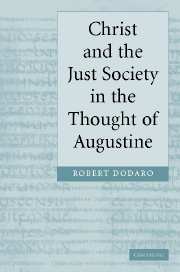Book contents
- Frontmatter
- Contents
- Acknowledgements
- List of abbreviations
- Introduction
- 1 Eloquence and virtue in Cicero's statesman
- 2 Justice and the limits of the soul
- 3 Christ and the formation of the just society
- 4 Divine eloquence and virtue in the scriptures
- 5 Wisdom's hidden reasons
- 6 Eloquence and virtue in Augustine's statesman
- General conclusion
- Select bibliography
- Index of references to Augustine's works
- Index of persons and subjects
1 - Eloquence and virtue in Cicero's statesman
Published online by Cambridge University Press: 22 September 2009
- Frontmatter
- Contents
- Acknowledgements
- List of abbreviations
- Introduction
- 1 Eloquence and virtue in Cicero's statesman
- 2 Justice and the limits of the soul
- 3 Christ and the formation of the just society
- 4 Divine eloquence and virtue in the scriptures
- 5 Wisdom's hidden reasons
- 6 Eloquence and virtue in Augustine's statesman
- General conclusion
- Select bibliography
- Index of references to Augustine's works
- Index of persons and subjects
Summary
What is a just society? How is it structured and how does it function? In approaching these questions, Augustine turns to Cicero's writings, principally to De re publica, both in his City of God and in his correspondence with public officials. His references to Cicero's work and thought in these letters suggest two significant points of divergence between their respective conceptions of a just society: the nature and aim of civic virtues and the crucial role of the statesman in fostering them within society. In these discussions, Augustine uses Cicero's text as a foil to argue the moral superiority of his own, alternative concepts of virtue and political leadership. Attention to these themes helps to explain why Cicero's discussion of justice in De re publica is important to the City of God, and ultimately how that discussion relates to Augustine's concept of a just society.
When in June 408 a mob stormed the Catholic church at Calama, 65 km. south-west of Hippo Regius, looted it, and set it ablaze, killing a Christian in the process, Nectarius, a former public official, wrote to Augustine on behalf of the municipal council and pleaded for his intercession with imperial officials to show clemency toward those non-Christians who would inevitably be accused, interrogated, tried, and punished for participation in the violence. In his response, Augustine observed that Nectarius had borrowed his praise of patriotism from Cicero's De re publica, and briefly discussed the character of civic virtue as described in that text.
- Type
- Chapter
- Information
- Publisher: Cambridge University PressPrint publication year: 2004



